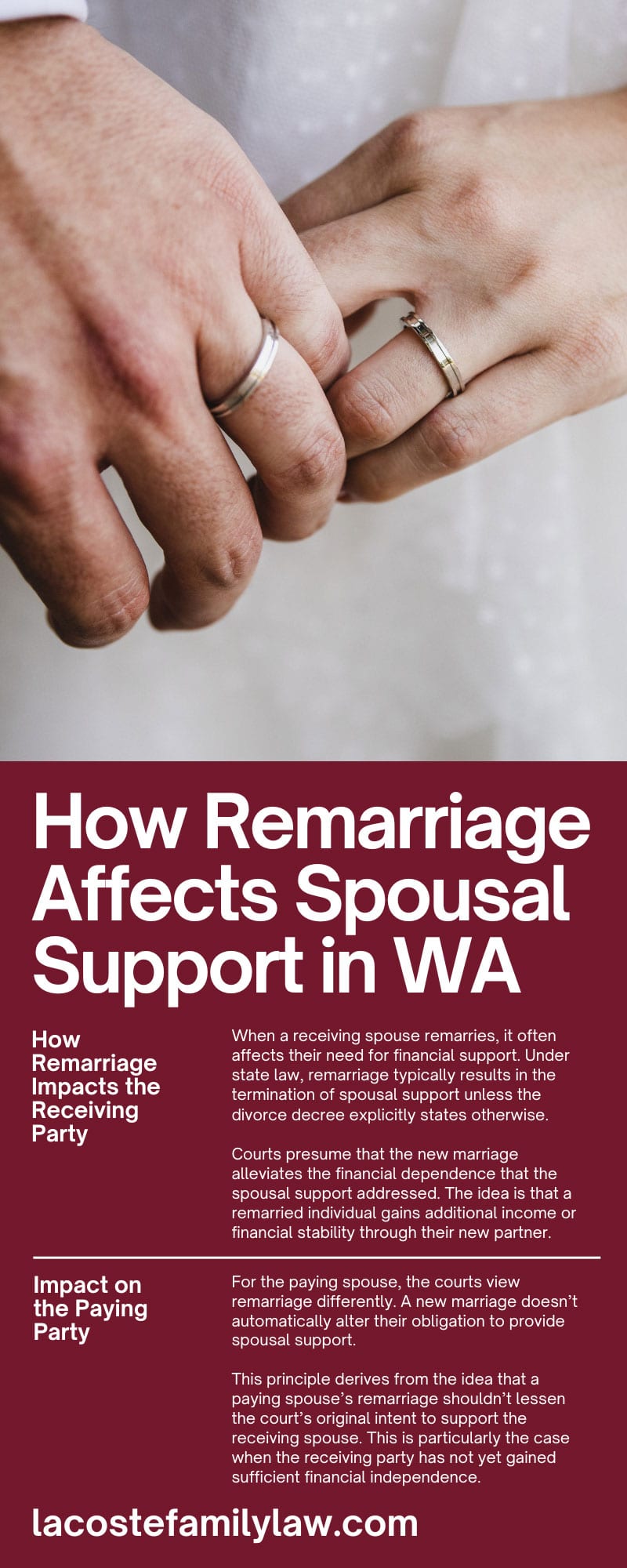
23 Oct How Remarriage Affects Spousal Support in WA
Spousal support, also known as alimony or spousal maintenance, is a financial arrangement designed to help a person maintain stability after a divorce. For many families, circumstances shift over time, influencing support obligations and creating questions around legal rights.
Remarriage is one such life event that can lead to legal and financial changes for both the paying and receiving parties in Washington State. Understanding how remarriage affects spousal support in WA is key to navigating this transition with clarity and confidence.
The Basics of Spousal Support in Washington
Spousal support aims to balance economic fairness between spouses as they move forward separately. Determined at the time of divorce, spousal support depends on several factors, including:
- The financial needs of the receiving party.
- The paying party’s ability to provide support.
- The length of the marriage.
- The living standards established during the union.
Unlike child support, courts don’t calculate spousal support using specific state guidelines. Instead, judges consider individual circumstances to determine what is fair. This flexibility allows for tailored outcomes but also means that modifications may be necessary if circumstances, like remarriage, change over time.
How Remarriage Impacts the Receiving Party
When a receiving spouse remarries, it often affects their need for financial support. Under state law, remarriage typically results in the termination of spousal support unless the divorce decree explicitly states otherwise.
Courts presume that the new marriage alleviates the financial dependence that the spousal support addressed. The idea is that a remarried individual gains additional income or financial stability through their new partner.
Cases of Exceptions
If the original support order specifies that payments continue regardless of remarriage, the paying spouse might remain obligated to provide support. This is why understanding the original terms of the support order is critical.
For example, in some high-asset divorces, spousal support agreements might include stipulations about continuance under particular circumstances. A prenuptial or postnuptial agreement could also outline specific terms for alimony payments postdivorce.
If the receiving spouse suspects that the remarriage clause doesn’t apply to their situation, they should consult a lawyer. A spousal support attorney at LaCoste Family Law, well-versed in spousal maintenance and prenuptial and postnuptial agreements, can review the terms and determine their rights.
Impact on the Paying Party
For the paying spouse, the courts view remarriage differently. A new marriage doesn’t automatically alter their obligation to provide spousal support.
This principle derives from the idea that a paying spouse’s remarriage shouldn’t lessen the court’s original intent to support the receiving spouse. This is particularly the case when the receiving party has not yet gained sufficient financial independence.
Nevertheless, consider if the paying party’s financial situation changes substantially due to family commitments in the new marriage. In the case of obligations such as supporting stepchildren, the paying party may petition the court for a modification to reduce their payment obligations. They must comprehensively demonstrate financial strain resulting from these new responsibilities, as courts are hesitant to reduce previously determined awards without demonstrable need.
Grounds for Modifying Spousal Support
Even if remarriage isn’t part of the equation, Washington courts allow modifications to spousal support orders provided there is a significant change in circumstances. These changes could include a sizable increase or decrease in either party’s income, severe illness, or other life-altering events.
For instance, if the paying spouse experiences an unexpected job loss, they may request a temporary or permanent adjustment. Similarly, a receiving spouse who becomes financially independent might agree to a reduced payment or termination of support altogether.
Still, the courts require robust evidence of the change in circumstances before approving any such decisions. Speculative changes or minor adjustments in income are unlikely to justify a modification.
The Role of Cohabitation in Spousal Support
When examining how remarriage affects spousal support in WA, also consider how cohabitation, though not legally equivalent to remarriage, can be influential. If the receiving spouse moves in with a new partner, it could suggest reduced financial necessity. While this does not automatically terminate spousal support as remarriage does, it may warrant a review of the arrangement.
The paying spouse has the right to bring forth evidence that cohabitation changed the receiving spouse’s financial situation. This may include proof that the new partner contributes to household expenses or otherwise relieves financial burdens. Courts will evaluate cohabitation cases on individual merit, considering how it impacts the original intent behind the spousal support order.
How To Address Financial Changes From Remarriage
For those navigating remarriage and spousal support adjustments, the first step is understanding the legal framework. Reviewing the original support order is essential, as its terms dictate how to handle changes. The attorney representing you at LaCoste Family Law can clarify responsibilities and potential outcomes, providing guidance tailored to specific circumstances.
If termination or modification of spousal support is appropriate, the paying or receiving party will need to file a motion with the court. Always present up-to-date financial information and evidence supporting the request since factual assessments of financial need and ability to pay determine decisions.
Protect Your Financial Interests
Given the complexity of spousal support laws, proactive steps toward understanding and safeguarding your financial interests are vital. Whether you pay or receive support, maintaining open communication and meticulous documentation can prevent unnecessary disputes.
For example, paying spouses should retain detailed proof of payments, while receiving spouses should document expenses and income changes. These records may become invaluable should disputes or court reviews arise.
Couples can also anticipate future needs by addressing remarriage and cohabitation scenarios during divorce proceedings. Including clear, enforceable language in spousal support agreements can prepare both parties for eventual changes, reducing the potential for conflict.
The Importance of Clear Legal Representation
Navigating legal processes around remarriage and spousal support often involves deep personal concerns. The right legal counsel can offer the expertise and empathy needed so both parties receive fair treatment while protecting their financial futures.
Legal professionals at LaCoste Family Law know the factors that courts consider when altering spousal support agreements. You will gain clarity regarding when it’s appropriate to request a modification. Your attorney also acts as an advocate, defending your rights and reducing the emotional burden of addressing financial changes during what can be an already challenging period.
Move Forward With Confidence
Remarriage, though a joyful chapter, can bring legal complexities that require attention. Proactively addressing these matters respects the rights of both parties and fosters fairness and stability. Clear communication, legal preparation, and adaptability make these transitions smoother, keeping families focused on what truly matters.
If you have questions about remarriage and its implications for spousal support, consult an experienced family law attorney in the Tri-Cities, WA, area today. The right legal representation and compassionate guidance can empower you to move forward with confidence and security.


